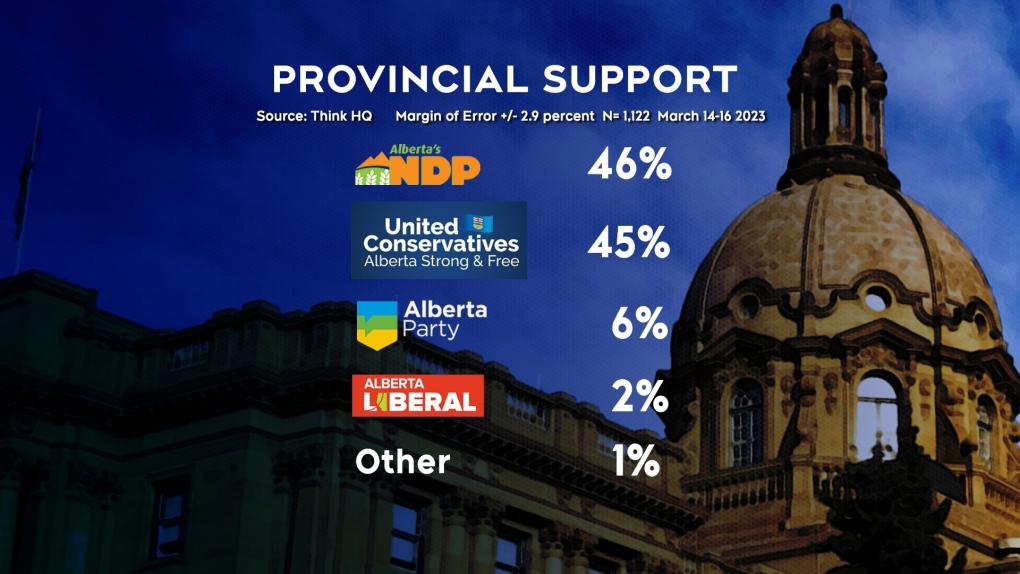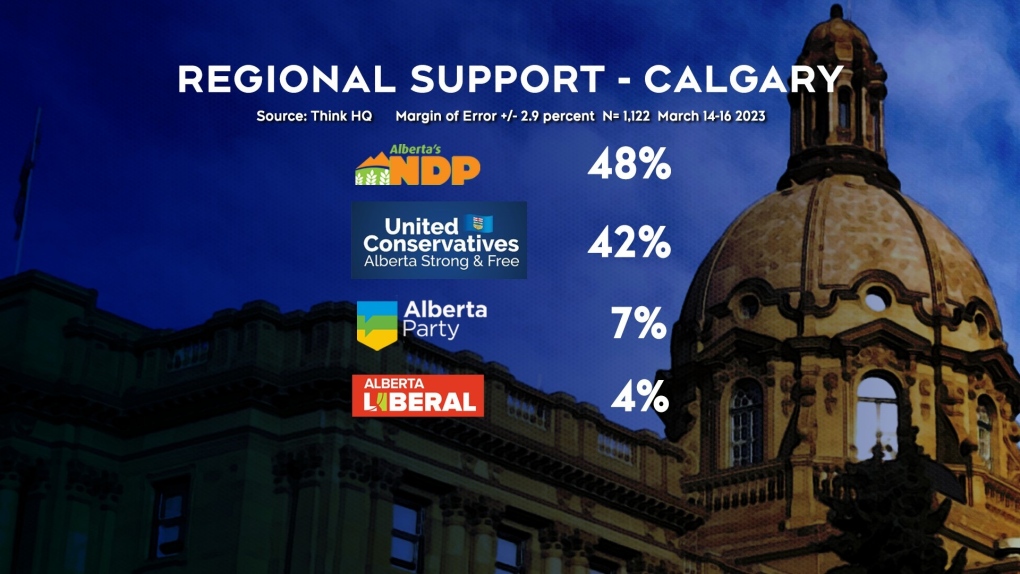Battle between UCP, NDP too close to call as provincial election inches closer: ThinkHQ
A new political poll surveying Albertans ahead of May's provincial election shows a deep divide within the province, with the governing United Conservative Party and Alberta's New Democrats fighting neck and neck for support.
ThinkHQ says if a provincial election were held tomorrow, the NDP hold a marginal edge with 46 per cent of the decided vote, statistically tied with the governing UCP with 45 per cent.
The firm says the Alberta Party remains well out of contention with only six per cent, followed by the Liberals at two per cent.
ThinkHQ Marc Henry says the governing UCP should have an easier path to re-election, with large support across rural Alberta.
"The results of this survey are a bit surprising, almost counter-intuitive," Henry said.
"The Smith government has released a 'chicken-in-every-pot' budget, are spending a lot on advertising the budget and their 'inflation-fighting' measures. Yet, they aren't seeing a return on that investment in the polls; in fact, they're down three points from January. Margin of error, but still."

ThinkHQ surveyed 1,122 people online between March 14 and 16.
Political experts say Calgary will be a battleground in the next election, deciding the outcome of the election.
ThinkHQ found the NDP lead in the city of Calgary among decided voters at 48 per cent, compared to 42 per cent for the UCP.
"If they can get that lead up to eight to 10 points, they'll win this," Henry said.
"The NDP basically need to get around 18 to 20 seats out of Calgary in order to win. The UCP need to hang on to six, seven or eight seats for them to win and not have to worry about other seats in other parts of the province."

However, the parties are evenly matched throughout the Calgary Metropolitan area, polling at 45 per cent each.
Premier Danielle Smith declined an interview with CTV outside her appearance in Cochrane at the Alberta Mid Sized Cities Mayors Caucus.
Her office says the party has come a long way in the polls since the fall.
"In the fall, the UCP was around 20 points down in the polls and now, less than six months later, we are tied with the NDP," press secretary Rebecca Polak said.
"This is a clear indication that Albertans have seen a positive change and have noted that our government is laser-focused on growing the economy, creating new opportunities, improving our health-care system and putting in the work to ensure that all Albertans can feel secure in their communities."
Joe Ceci, municipal affairs critic with Alberta’s NDP, says the ground made up in Calgary by the party speaks to what Calgarians are seeking in government come the next election.
"They can either vote for the UCP that is kind of doing things that people don't want, or they can focus on fixing health care, fixing education, making sure that we revitalize downtown Calgary," Ceci said.
In Edmonton, ThinkHQ says, voters are most likely to vote NDP, securing 64 per cent of the vote, compared with the UCP’s 24 per cent.
In small urban areas and rural communities, the UCP is expected to receive around more than 55 per cent of the vote.
One political scientist from the University of Lethbridge says there may be some divide from the staunch conservatives not supportive of a big budget recently passed by the UCP government.
"To some extent, the budget almost looks like it was an NDP budget," Trevor Harrison said.
"So, that goes against the grain of some people who have supported the party."
The poll found women or those under the age of 35 are more inclined to vote for Rachel Notley.
The majority of men and those over the age of 35 are more inclined to vote blue.
The poll has a margin of error of +/- 2.9 percentage points, 19 times out of 20.
Alberta's provincial election is set for May 29.
CTVNews.ca Top Stories

MPP Sarah Jama asked to leave Ontario legislature for wearing keffiyeh
MPP Sarah Jama was asked to leave the Legislative Assembly of Ontario by House Speaker Ted Arnott on Thursday for wearing a keffiyeh, a garment which has been banned at Queen’s Park.
Mountain guide dies after falling into a crevasse in Banff National Park
A man who fell into a crevasse while leading a backcountry ski group deep in the Canadian Rockies has died.
2 teens charged in Halifax homicide: police
Two teenagers have been charged with second-degree murder in connection to an alleged homicide near the Halifax Shopping Centre earlier this week.
'Deep ignorance': Calls for Manitoba trustee to resign sparked after comments about Indigenous people and reconciliation
A rural Manitoba school trustee is facing calls to resign over comments he made about Indigenous people and residential schools earlier this week.
ByteDance prefers TikTok shutdown in U.S. if legal options fail, Reuters sources say
TikTok owner ByteDance would prefer to shut down its loss-making app rather than sell it if the Chinese company exhausts all legal options to fight legislation to ban the platform from app stores in the U.S., four sources said.
12-year-old hippo in Japan raised as a male discovered to be a female
When Gen-chan arrived at a zoo in Japan in 2017, no one questioned whether the then-five-year-old hippopotamus was a boy. Seven years later, zoo staff made a surprising discovery: Gen-chan, now 12, was female.
Here's why Harvey Weinstein's New York rape conviction was tossed and what happens next
Here's what you need to know about why movie mogul Harvey Weinstein's rape conviction was thrown out and what happens next.
Improve balance and build core strength with this exercise
When it comes to cardiovascular fitness, you may tend to focus on activities that move you forward, such as walking, running and cycling.
Legendary hockey broadcaster Bob Cole dies at 90: CBC
Bob Cole, a welcome voice for Canadian hockey fans for a half-century, has died at the age of 90. Cole died Wednesday night in St. John's, N.L., surrounded by his family, his daughter, Megan Cole, told the CBC.
































